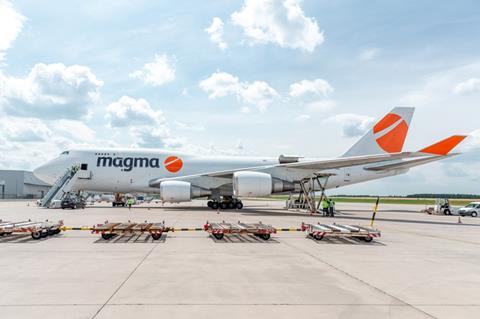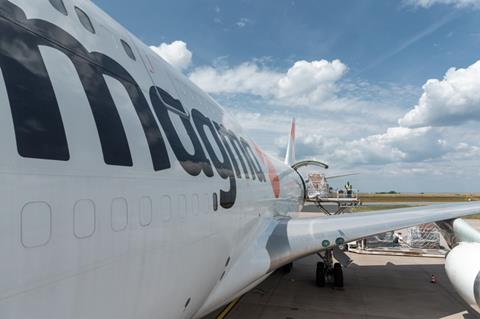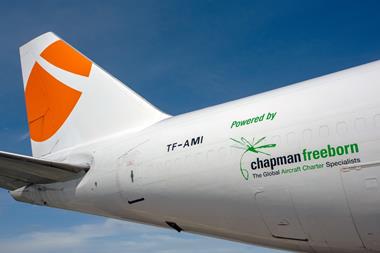Freighter fleet and network expansion are already key strategic ambitions for Conor Brannigan, recently appointed chief executive of Magma Aviation, writes Roger Hailey.
Brannigan, appointed in October last year after joining the cargo management company in July, started his aviation and cargo career with Aer Lingus in 2006 until 2013.
He continued his airfreight journey with six years at Etihad Cargo and two years at Cargolux before joining Gatwick-based Magma.
He heads a company that manages a fleet of five Boeing 747-400 aircraft and offers ad hoc and regular flying capacity to freight forwarders, logistics providers, and charter brokers.
“Aer Lingus customer services was my first foray into air cargo, and at that time I was not aware the cargo moved on passenger aircraft. So it was quite new for me to understand that, when flying across the Atlantic, beneath the floor there could be pharmaceuticals, live animals or other cargo”.
Brannigan worked in various roles at Aer Lingus, from customer service to capacity control, before moving into analytics and the development side of the business.
The latter aspect involved dealing with Aer Lingus’ interline cargo relationships with both Etihad and Emirates when they started flying into Dublin from Abu Dhabi and Dubai.
“I absolutely loved my time at Aer Lingus and after seven years found it extremely difficult to leave. It was a big step for my wife and me but we thought why not give it a go.
“I finished with Aer Lingus on the Friday, flew to Abu Dhabi on the Saturday and began with Etihad on the Monday morning.”
New beginnings
Brannigan refers with fondness to the “whirlwind that was my six years at Etihad Airways”.
He continues: “The airline was growing 25%-30% year on year with its fleet and with the equity investments in several airlines that ultimately all went wrong, and then there was the cost-cutting.
“I have seen it all really. The experiences I gained at Etihad and the relationships and friendships forged were incredible. It was one of the best times in my life.”
After six years in the Middle East working in alliances, sales-operations, and marketing and development, plus two children born in Abu Dhabi, it was time to think about schools.
“With my family so far away in Ireland we thought about getting back to Europe, but it had to be the right move professionally as well. The opportunity arose at Cargolux with the role of director of strategic alliance market development.
“It was a great fit and Cargolux is the best freighter operator in the world with a fantastic reputation and a sizeable fleet of Boeing 747s.”
Next came the offer this year of deputy chief executive at ambitious Magma, a cargo management company founded in 2010 by some of the former management team at MK Airlines. In 2017 charter broker Chapman Freeborn ramped up its minority shareholding in Magma to 75%.
Chapman Freeborn has since been taken over by Cyprus-headquartered Avia Solutions Group (ASG) in October 2019, making Magma part of a much larger aviation specific family which includes European ACMI charter and cargo operator SmartLynx Airlines, Icelandic air cargo airline Bluebird Nordic and AviaAM Leasing.
Brannigan was no stranger to Magma as he knew two of three pioneers who launched the carrier due to interactions while at Etihad.
“I thought it would be a good fit and a more senior position with quite a young company in air cargo terms, plus it also has Chapman Freeborn and the ASG group behind it.
“There is a lot of potential here and I didn't have to think twice about the role.”
In a planned succession from the day he joined, Brannigan worked closely with Magma chief executive Ross Wilson for three months before Wilson moved to the role of strategic advisor to the Magma Aviation board of directors.
“A management change on day one would not have been not the right decision, so it was important to get those three months of transition. It was important for me as well, to get up to speed with the business. It has been a very interesting journey.”
Expansion ambitions
In May this year, Magma expanded its fleet with one Boeing 747-400F through a partnership with Plus Logistics Solutions, bringing the managed fleet to five aircraft.
Brannigan explains: “We have five Boeing 747s, comprising three BCFs and two 400s. We have three ACMIs directly from Air Atlanta Icelandic and one Boeing 747 which shareholders ASG group bought on behalf of Magma in a CMI deal with Air Atlanta as well but on a lease within the ASG group.
“And there is one ACMI aircraft from Plus Logistics which is operated by Atlas. So, we don't keep things simple.”
Does the Magma boss see further aircraft on the horizon?
“In terms of flights or fleet expansion, we could probably take another four or five freighters right away but in the current market conditions that is not possible. Freighter operators are fully utilised and that is likely to be the scenario for the rest of this year, in 2022, and I suspect for quite a big portion of 2023.
“As things stand, we will seek extensions from the current providers and keep our ears open in the market, plus we have the ASG group with a couple of AOCs within the group, Bluebird Cargo and SmartLynx, which are operating cargo services.”
The longer term possibilities include Boeing 777s, whether production line or conversions, joining the Magma fleet.
Says Brannigan: “The likelihood is that it will involve B777s of some sort whether converted -300s or-200s, or even off the line production aircraft. That is still quite a long way away, in terms of 2024 or 2025. There are already not so firm plans in place but we are looking at it.”
African connections
For historic reasons linked to the founders’ background, Magma has strong network connections into Africa, but has been expanding its presence in the US, driven by a relationship with freight forwarder Senator International, recently acquired by Danish container shipping giant Maersk, which also ordered two production line B777Fs and will lease three B767-300Fs.
“That African network is historic and stemmed from the founders’ long-term connections with key customers in Africa, but Magma developed the relationship with Senator and we expanded to the US and that is now a significant portion of our overall flying today.”
Magma serves Kenya’s perishables business with four flights a week between European hub Liege in Belgium and Nairobi. Magma serves Rockford, Greenville–Spartanburg, Atlanta, New York’s JFK and Chicago in the US but also India, Hong Kong and Singapore.
Brannigan advises that, with the current fleet size, Magma will continue the current flights ratio between Europe to Africa and Europe to the US, but any additional aircraft, in particular the longer range and more economic B777F, would allow expansion of the Hong Kong schedule and then into China.
Asked about the current market [as of mid-November], the Magma boss says: “We will know by February and January next year what this fourth quarter was really like, and the expectations are that it will be the best fourth quarter in years, and perhaps forever, because things will start to normalise sometime.
“At Magma, our main focus is on long-term contracts with our key customers, so we do not see the peaks and troughs that an airline working on a per kilo basis would experience.
“Our sales team are non-stop at the moment so we maintain a robust schedule and we put in gaps here and there for ad hoc charter work wherever possible but the main bulk of our schedule is maxed out already with customers on long-term contractual deals with us.”
Asked about the Senator takeover by Maersk, Brannigan says: “We are very positive about it.”
He adds: “Magma has a long-standing relationship with Senator and we continue that today and hope to continue it in the future. Instead of dealing with Senator we will eventually work with the team at Maersk and we feel that this could lead to expansion and new opportunities. The relationship with Senator has been an extraordinary success and it is something we are extremely proud of.”
It is now the fashion for big shipping lines to enter the air cargo market with freighter aircraft. Maersk already had its Star subsidiary, mostly serving the European network needs of UPS, while CMA CGM of France launched its own freighter operation this year with five A330-200Fs and has already ordered two B777Fs and four Airbus A350Fs.
Brannigan acknowledges that there are unknowns about Maersk’s future airfreight plans but believes that they will continue to work with Magma and build on great partnership.
“It is a lucrative airfreight market at the moment and will continue to be so for the foreseeable future, and so the shipping lines want to get a piece of that, to ensure that one entity within the group has access to as much airfreight capacity as possible.
“Maersk, with Maersk logistics and now with Senator, wants to ensure that these companies can get airfreight capacity that is reliable because we don’t know what is in the future.
“We hope that we are coming out of this pandemic but we just don't know whether countries will go into lockdown and all of a sudden belly capacity is impacted again.
“If that happens, the reliance will again be on freighter operators because they can operate relatively unhindered in the global market today and therefore offer reliable capacity.”
Looking to the horizon
Reliable crystal balls are in short supply, but what is Brannigan’s strategy for Magma?
“We do five-year plans in this business but it is even hard to plan next week now because of the current complexities in the market.
“We see a good year in 2022 for freighter operators and we see bellyhold capacity slowly coming back from April next year, once the summer schedule in the northern hemisphere comes in.
“But we see seismic shifts in consumer behaviour and with e-commerce continuing and that can only be good for freighter providers who have the right capacity in the right markets to capitalise on that. In 2023 we will see further softening in the market because of the return of belly capacity, and we see the likes of Africa unfortunately still getting to grips with Covid later into next year.
“With belly capacity still being down, as a company that manages freighter aircraft, we are ready to provide capacity to those key markets.”
As for 2024: “Who knows, but we might evolve our fleet, possibly with B777s or more B747s.”
On the subject of sustainability, although it uses capacity from other airlines that have their own carbon reduction programmes, Magma procures 80% of the fuel for its operation: “We manage fuel contracts and are out there tendering sustainable aviation fuel (SAF) which, unfortunately, is not readily available at the moment and is extremely expensive. But that is beside the point and it is something we are pursuing with our partners to implement."
Will Magma surf the e-commerce swell?
“E-commerce is a buzzword that has been floating around for a long time but everybody flies e-commerce now. It is just sometimes not classified as e-commerce because it is moved as general cargo.
“The bottom line is that e-commerce will continue to grow, but you have to be in the right markets to carry it. You need to be in China, you need to be in Hong Kong and emerging e-commerce markets such as India.
“It becomes a bigger portion of your overall volumes but general cargo is not going away and we will still be talking about perishables, pharma and semiconductors, those things which remain the baseload for any operator, particularly those who do not have access to those Asia Pacific markets that are leveraging e-commerce.
“I don't get as excited about e-commerce as some people.”










